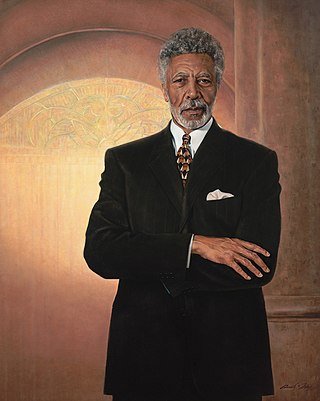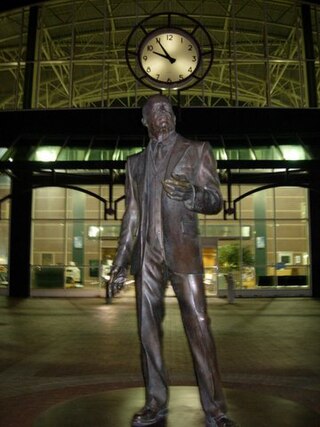Related Research Articles

The AIDS epidemic, caused by HIV, found its way to the United States between the 1970s and 1980s, but was first noticed after doctors discovered clusters of Kaposi's sarcoma and pneumocystis pneumonia in homosexual men in Los Angeles, New York City, and San Francisco in 1981. Treatment of HIV/AIDS is primarily via the use of multiple antiretroviral drugs, and education programs to help people avoid infection.

Founded in 1925, The Brotherhood of Sleeping Car Porters (BSCP) was the first labor organization led by African Americans to receive a charter in the American Federation of Labor (AFL). The BSCP gathered a membership of 18,000 passenger railway workers across Canada, Mexico, and the United States.

Ronald Vernie Dellums was an American politician who served as Mayor of Oakland from 2007 to 2011. He had previously served thirteen terms as a Member of the U.S. House of Representatives from California's 9th congressional district, in office from 1971 to 1998, after which he worked as a lobbyist in Washington, D.C.
The Green Belt Movement (GBM) is an indigenous grassroots organization in Kenya that empowers women through the planting of trees. It is one of the most effective and well-known grassroots organisations addressing the problem of global deforestation. Professor Wangari Maathai established the organization in 1977 under the auspices of the National Council of Women of Kenya (NCWK). GBM's successes in forest conservation, education, and women's economic empowerment have gained the organisation worldwide acclaim. It is also noted for its advocacy of human rights, democratisation of access to public lands, and environmental justice issues such as the role of women's traditional ecological knowledge in addressing environmental degradation and desertification.

Delta Sigma Theta Sorority, Inc. (ΔΣΘ) is a historically African American sorority. The organization was founded by college-educated women dedicated to public service with an emphasis on programs that assist the African American community. Delta Sigma Theta was founded on January 13, 1913 by twenty-two women at Howard University in Washington, D.C. Membership is open to any woman who meets the requirements, regardless of religion, race, or nationality. Women may apply to join through undergraduate chapters at a college or university or through an alumnae chapter after earning a college degree.
The Chicago Women's Liberation Union (CWLU) was an American feminist organization founded in 1969 at a conference in Palatine, Illinois.

Cottrell Laurence Dellums was an American labor activist and one of the organizers and leaders of the Brotherhood of Sleeping Car Porters.
The Joint Center for Political and Economic Studies is an American public policy think tank headquartered in Washington, DC. According to its mission statement, the Joint Center, through research, policy roundtables, and publications, produces innovative, high-impact ideas, research, and policy solutions that have a positive impact on people and communities of color. Ranking at #50 on the University of Pennsylvania's 2017 Global Go To Think Tank Index Report, the Joint Center served as the intellectual hub for a generation of post-Civil Rights era black thinkers, including Maynard Jackson, Mary Frances Berry, William Julius Wilson, Shirley Chisholm and John Hope Franklin. Originally founded in 1970 to provide training and technical assistance to newly elected African American officials, the Joint Center has since expanded its portfolio to include a range of public policy issues of concern to African-Americans, AAPIs, Latinos, and Native Americans.
Reproductive justice is a critical feminist framework that was invented as a response to United States reproductive politics. The three core values of reproductive justice are the right to have a child, the right to not have a child, and the right to parent a child or children in safe and healthy environments. The framework moves women's reproductive rights past a legal and political debate to incorporate the economic, social, and health factors that impact women's reproductive choices and decision-making ability.
Elaine R. Jones is an American civil rights attorney and activist. She joined the NAACP Legal Defense Fund (LDF) in 1970 and in 1993 became the organization's first female director-counsel and president.

Race in the United States criminal justice system refers to the unique experiences and disparities in the United States in regard to the policing and prosecuting of various races. There have been different outcomes for different racial groups in convicting and sentencing felons in the United States criminal justice system. Although prior arrests and criminal history is also a factor. Experts and analysts have debated the relative importance of different factors that have led to these disparities.

Carole Ward Allen is an American politician, professor, and political consultant. She is a member of the Democratic Party, and serves as the chief executive officer of CWA Partners, LLC. As a mass transportation executive in the State of California, Ward Allen served three four-year terms as an elected member of the San Francisco Bay Area Rapid Transit District Board of Directors representing the 4th district from 1998 until 2010.
The War on Drugs is a term for the actions taken and legislation enacted by the US federal government, intended to reduce or eliminate the production, distribution, and use of illicit drugs. The War on Drugs began during the Nixon administration with the goal of reducing the supply of and demand for illegal drugs, but an ulterior racial motivation has been proposed. The War on Drugs has led to controversial legislation and policies, including mandatory minimum penalties and stop-and-frisk searches, which have been suggested to be carried out disproportionately against minorities. The effects of the War on Drugs are contentious, with some suggesting that it has created racial disparities in arrests, prosecutions, imprisonment, and rehabilitation. Others have criticized the methodology and the conclusions of such studies. In addition to disparities in enforcement, some claim that the collateral effects of the War on Drugs have established forms of structural violence, especially for minority communities.

Clara Stanton Jones was the first African-American president of the American Library Association, serving as its acting president from April 11 to July 22 in 1976 and then its president from July 22, 1976 to 1977. Also, in 1970 she became the first African American and the first woman to serve as director of a major library system in America, as director of the Detroit Public Library.

The National Black Deaf Advocates (NBDA) is the leading advocacy organization for thousands of Black deaf and hard of hearing people in the United States. Black Deaf leaders were concerned that deaf and hard-of-hearing African-Americans were not adequately represented in leadership and policy decision-making activities that were affecting their lives.

The United Front Against Fascism (UFAF) was an anti-fascist conference organized by the Black Panther Party and held in Oakland, California, from July 18 to 21, 1969.

Aileen Hernandez was an African-American union organizer, civil rights activist, and women's rights activist. She served as the president of the National Organization for Women (NOW) between 1970 and 1971, and was the first woman to serve on the Equal Employment Opportunity Commission.
The Hispanic Federation (HF) is a U.S based non-governmental organization focused on supporting Hispanic communities through local, state, and national advocacy. The Federation was founded in New York City in 1990 by a small group of Latino leaders, establishing initiatives to advocate for the interests of the Hispanic community and has expanded to establish programs, and policies in 16 states. The organization's objective is to empower and advance the Hispanic community primarily through service pillars, membership services, advocacy, and community programs. The Federation has formed relationships with a network of 100 Latino grassroots nonprofits, as well as collaborating with organizations, government officials, and private sector partners to enact systemic change related to a variety of socioeconomic issues for Hispanic communities. The Federation has gained national recognition for its work in areas of education, health, immigration, economic empowerment, civic engagement, environment, and organizational development to strengthening Latino institutions to ultimately increase the quality of life within Hispanic communities.

Decarceration in the United States involves government policies and community campaigns aimed at reducing the number of people held in custody or custodial supervision. Decarceration, the opposite of incarceration, also entails reducing the rate of imprisonment at the federal, state and municipal level. As of 2019, the US was home to 5% of the global population but 25% of its prisoners. Until the COVID-19 pandemic, the U.S. possessed the world's highest incarceration rate: 655 inmates for every 100,000 people, enough inmates to equal the populations of Philadelphia or Houston. The COVID-19 pandemic has reinvigorated the discussion surrounding decarceration as the spread of the virus poses a threat to the health of those incarcerated in prisons and detention centers where the ability to properly socially distance is limited. As a result of the push for decarceration in the wake of the pandemic, as of 2022, the incarceration rate in the United States declined to 505 per 100,000; meaning that the United States no longer has the highest incarceration rate in the world, but remains in the top 5.

The COVID-19 pandemic has revealed race-based health care disparities in many countries, including the United States, United Kingdom, Norway, Sweden, Canada, and Singapore. These disparities are believed to originate from structural racism in these countries which pre-dates the pandemic; a commentary in The BMJ noted that "ethnoracialised differences in health outcomes have become the new normal across the world" as a result of ethnic and racial disparities in COVID-19 healthcare, determined by social factors. Data from the United States and elsewhere shows that minorities, especially black people, have been infected and killed at a disproportionate rate to white people.
References
- ↑ Springer, Kimberly (2005). Living for the revolution : Black feminist organizations, 1968-1980. Durham [N.C.]: Duke University Press. p. 62. ISBN 978-0-8223-8685-8. OCLC 654514220.
- 1 2 "ABOUT BLACK WOMEN ORGANIZED FOR POLITICAL ACTION (BWOPA)". www.bwopatileleads.org/.
- ↑ "Black Women Organized for Political Action - Introducing intersectionality to civil rights | Street Stories: Oakland". Street Stories: Oakland. Retrieved 2017-03-26.
- ↑ Springer, Kimberly (2001). "The Interstitial Politics of Black Feminist Organizations". Meridians. 1 (2): 155–191. doi:10.1215/15366936-1.2.155. ISSN 1536-6936. JSTOR 40338461. S2CID 145489776.
- ↑ Bell, Janet Dewart (2018). Lighting the fires of freedom : African American women in the civil rights movement. New York. p. 69. ISBN 978-1-62097-335-6. OCLC 1004577976.
{{cite book}}: CS1 maint: location missing publisher (link) - ↑ "- Dezie Woods Jones Jump". www.leadershipcalifornia.org. Retrieved 2017-03-26.[ permanent dead link ]
- ↑ "About". BLACK WOMEN ORGANIZED FOR POLITICAL ACTION. Retrieved 2017-03-26.
- ↑ Paulson, Kimberley (2003). "Electoral Tools & Tactics: Public education campaigns, candidate training programs and more". Race, Poverty & the Environment. 10 (2): 63–65. ISSN 1532-2874. JSTOR 41554403.
- ↑ "Black Women Organized for Political Action".